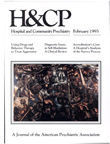Treating Revolving-Door Patients Who Have "Hospitalphilia": Compassion, Coercion, and Common Sense
Abstract
Treatments applicable to the frequently rehospitalized psychiatric patient-the so-called revolvingdoor patient-have been poorly delineated. One subgroup of these patients includes those for whom recidivism has become a way of life; they may be said to suffer from "hospitalpbilia". Neither refractoriness to treatment nor noncompliance with medications explains their frequent admissions. The author presents ten clinical principles to guide treatment planning for this subgroup of patients. The principles emphasize cooperation between the patient and the treatment agencies in creating a comprehensive, consistent, and enforceable plan to reduce unnecessary hospitalizations. Four treatment strategies based on the principles are outlined: unlimited access to hospitalization, a chit or voucher system, a rationing system, and an approach centered on the patient's expressed ability to avoid hospitalization.
Access content
To read the fulltext, please use one of the options below to sign in or purchase access.- Personal login
- Institutional Login
- Sign in via OpenAthens
- Register for access
-
Please login/register if you wish to pair your device and check access availability.
Not a subscriber?
PsychiatryOnline subscription options offer access to the DSM-5 library, books, journals, CME, and patient resources. This all-in-one virtual library provides psychiatrists and mental health professionals with key resources for diagnosis, treatment, research, and professional development.
Need more help? PsychiatryOnline Customer Service may be reached by emailing [email protected] or by calling 800-368-5777 (in the U.S.) or 703-907-7322 (outside the U.S.).



